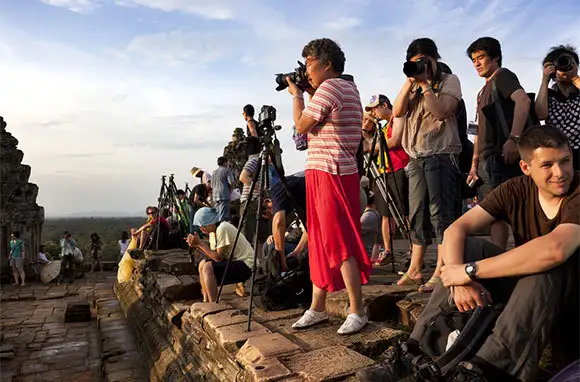
Standing atop the ramparts of China’s Great Wall. Snorkeling the Great Barrier Reef in Australia. These are the giants of our collective imagination, the plumes in our travel cap. Though they might seem timeless, many of the world’s most treasured sites are in peril, threatened by theft, development, climate change, or unsustainable tourism.
Featuring some of the world’s most popular destinations, our picks draw from UNESCO’s World Heritage in Danger list as well as Disappearing World: 101 of the Earth’s Most Extraordinary and Endangered Places by Alonzo C. Addison. From ancient cities to virgin rainforests, we hope these wonders stick around to inspire future generations.
Image Gallery
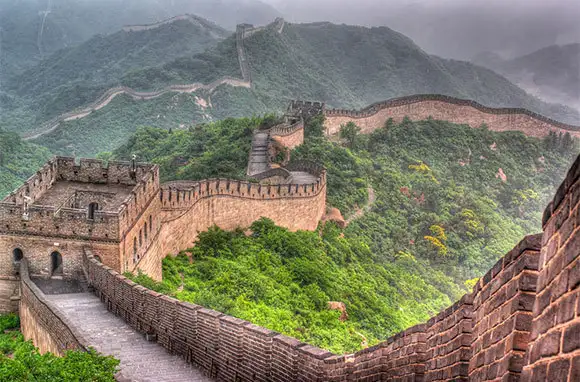
Great Wall, China
Constructed to shelter China's people and culture from the outside world, the Great Wall stretches over 4,500 miles and took 2,000 years to construct. UNESCO calls it "an absolute masterpiece" not only "because of the ambitious character of the undertaking but also the perfection of its construction." But perfection isn't protection, and the Great Wall is now under threat from the pressures of the modern world.
Unsurprising given its incredible length, large portions of the wall now suffer from neglect and erosion from the elements. More popular sections are subject to the wear and tear that comes with millions of visitors each year. But according to Addison, the biggest threat to the Great Wall may be the "slow and seemingly innocuous destruction and brick-by-brick looting. Portions that had survived for 2,000 years have vanished in recent decades and there are reports of quarrying in many locations."

Great Wall, China
Constructed to shelter China's people and culture from the outside world, the Great Wall stretches over 4,500 miles and took 2,000 years to construct. UNESCO calls it "an absolute masterpiece" not only "because of the ambitious character of the undertaking but also the perfection of its construction." But perfection isn't protection, and the Great Wall is now under threat from the pressures of the modern world.
Unsurprising given its incredible length, large portions of the wall now suffer from neglect and erosion from the elements. More popular sections are subject to the wear and tear that comes with millions of visitors each year. But according to Addison, the biggest threat to the Great Wall may be the "slow and seemingly innocuous destruction and brick-by-brick looting. Portions that had survived for 2,000 years have vanished in recent decades and there are reports of quarrying in many locations."
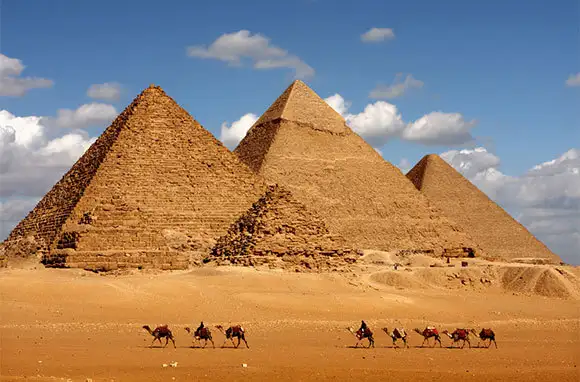
Memphis and Its Necropolis, Egypt
Until you get an aerial view of Memphis and its necropolis, you may not realize just how close the sprawl of Cairo has crept to the three pyramids and the Sphinx at Giza, Memphis' best-known sites and the sole survivors of the original Seven Wonders of the World. Where a hundred years ago, the pyramid fields of Memphis stood alone as beacons in a vast desert, today hotels and shops surround the site.
In the 1990s, a highway plan that would have damaged the site was successfully thwarted, but development, rising groundwater, pollution, and theft continue to threaten the mysterious tombs, monuments, and pyramids of Memphis.
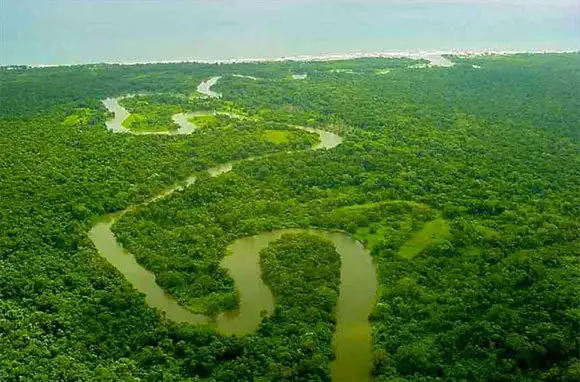
Rio Platano Biosphere Reserve, Honduras
The Rio Platano Biosphere Reserve, one of the last virgin tropical rainforests in Central America, remains—at least for now—a portrait of abundance. The mountainous landscape, which slopes down to the Caribbean, teems with wildlife, including 39 species of mammal and nearly 400 species of bird. Human cultures, past and present, are an important part of the biosphere's riches as well: Not only does the reserve include Ciudad Blanca, an important Maya site, but the forest is home to more than 2,000 indigenous people who have preserved their traditional ways of life.
The more than 1,900 square miles of pristine rainforest are under serious threat, though. In 2011, the government of Honduras requested that the UNESCO World Heritage site be put on the World Heritage in Danger list to mobilize against threats, including illegal logging, poaching, uncontrolled commercial hunting of wild animals, slash-and-burn colonization, and the introduction of exotic species.
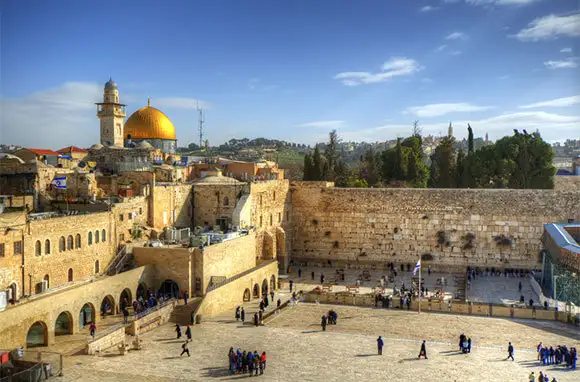
Old City of Jerusalem, Jerusalem
Originally inscribed as a World Heritage site in 1981, the Old City of Jerusalem has been on the World Heritage in Danger list since 1982—longer than any other of the list's 38 imperiled properties.
Considered a holy city in Judaism, Christianity, and Islam, Jerusalem proves its popularity with record-breaking tourist numbers. In 2010 alone, the city hosted 3.5 million travelers, and local government hopes to welcome 10 million visitors this decade. And Old Jerusalem, with its 220 historic monuments—including the famous Dome of the Rock and Wailing Wall—is a must-see stop on the Jerusalem tourist circuit. That's a lot of pressure for a site already straining under the weight of heavy tourism and a lack of maintenance. Will Jerusalem's Old City be preserved for future generations? Unless the government can ensure the conservation of its most treasured monuments, maybe not.
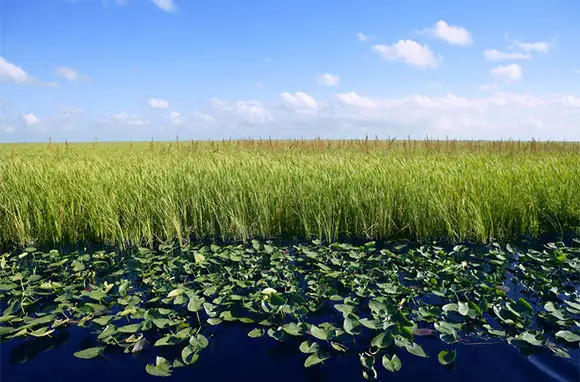
Everglades National Park, United States
Beautifully described as "a river of grass flowing imperceptibly from the hinterland into the sea," Everglades National Park has made several appearances on the World Heritage in Danger list since its inscription as a World Heritage site 34 years ago. A haven for rare and threatened species, including the Florida panther and the manatee, the national park comprises an astounding variety of water habitats, including the Western Hemisphere's largest mangrove ecosystem.
However, the very life source of its riches—the aquatic ecosystem—is in peril. Years of draining, dike building, and construction have reduced water inflows by up to 60 percent and destroyed more than half of the original Everglades. Water pollution from agricultural runoff and contaminated storm water has caused a decline in marine species. And while the response to its 2010 inclusion on the World Heritage in Danger list has been swift, successfully restoring and conserving the Everglades is a job that will stretch far beyond the park's watery boundaries.
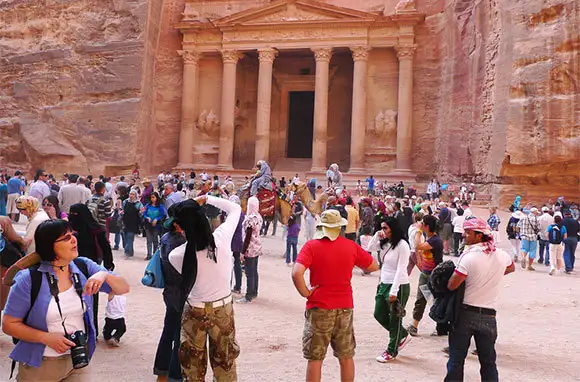
Petra, Jordan
Once a thriving trade center for frankincense, myrrh, and spices, the ancient city of Petra continues to attract curious visitors in search of beauty and cultural riches. The ruins of the city, which was half built and half carved into red sandstone cliffs, hold architecturally elaborate tombs along with temples, sacrificial altars, and even a Roman-style amphitheater.
But while beautiful, the red sandstone is soft and easily eroded. The dramatic rise in visitors over recent decades—from 65,000 in 1986 to nearly 1 million in 2010—is taking its toll. Human feet, along with the hooves of camels and donkeys hired by tourists, wear away at the stonework paths, and visitors hasten erosion by touching the carved buildings. According to Addison, it took only a decade of tourists leaning against and touching the Al Khazneh (The Treasury) to wear down its surface by 1.5 inches. The Petra National Trust lists other threats to the site, including structural instability and site-management issues. As the city slowly disappears under the fingers of millions, it seems uncertain what will remain for future generations.
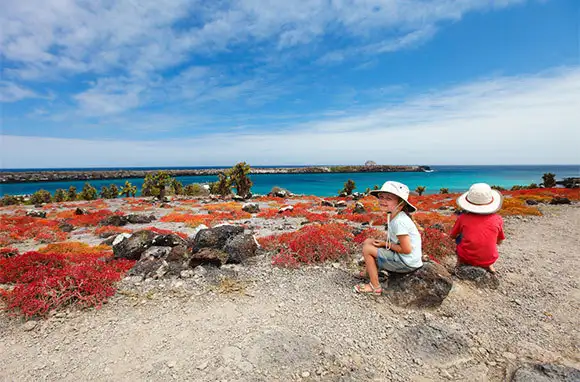
Galapagos Islands, Ecuador
Three years after their inclusion on the World Heritage in Danger list, the Galapagos Islands have emerged on the other end, having made significant headway against the threats of "invasive species, unbridled tourism, and overfishing." However, the same isolation that made the islands a "living museum and showcase of evolution" also makes them intrinsically vulnerable to the environmental pressures of tourism and the constant threat of invasive species.
Best known for unique animal life, such as the land iguana and giant tortoise, the Galapagos are a point of pilgrimage for wildlife lovers. But our presence changes the landscape: In the islands' relatively short history of human settlement, it's estimated that about five percent of the Galapagos' species have become extinct. It will take the continued efforts of Ecuador's government to preserve the Pacific archipelago that inspired Darwin's theory of evolution by natural selection.
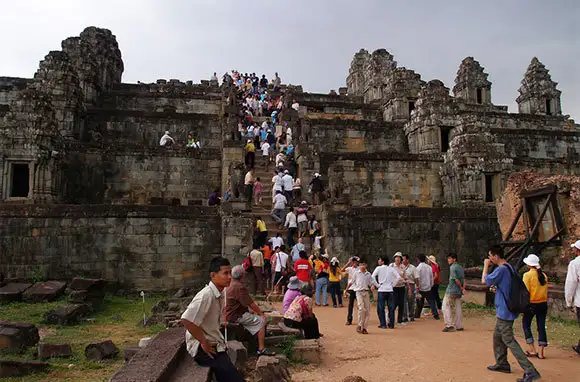
Angkor, Cambodia
The 150-square-mile Angkor Archaeological Park protects just a part of what was once a vast cluster of ancient capitals in the jungle of Cambodia. Its best known site, Angkor Wat, remains even today the world's largest religious building.
In 2004, after pillaging and landmine problems were successfully tackled, Angkor was removed from the World Heritage in Danger list, but it remains at risk. The dramatic rise in visitors—from zero during the dangerous '70s and '80s to 640,000 foreign visitors in the first three months of 2012 alone—has taken its toll on the buildings and temples. Soft sandstone steps and carvings have already been worn away under the feet of so many visitors, though in recent years authorities have limited the number of people allowed on the most popular buildings and added wooden staircases to protect the soft stone steps. The threats to the site extend beyond the park itself: Authorities have warned that groundwater pumping to cater to visitors in nearby Siem Reap has caused some of the temples to sink.
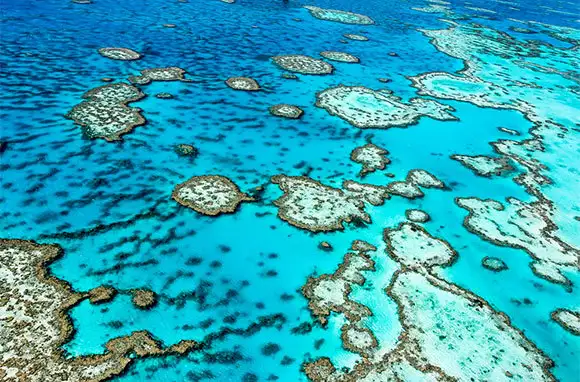
Great Barrier Reef, Australia
It's the world's most extensive coral-reef ecosystem, home to 400 types of coral, 1,500 species of fish, and 4,000 types of mollusk. The Great Barrier Reef draws visitors to Australia from all over the world, but climate change is threatening the very framework of the remarkable living marine system.
As ocean temperatures rise and waters become more acidic, the Great Barrier Reef is expected to be "subjected to increasingly frequent bleaching events, cases in which corals turn white and may die," according to a UNESCO report. More immediately, the approval of a Liquefied Natural Gas processing facility within the World Heritage property has drawn serious concern from experts worried about its impact on the marine ecosystem.
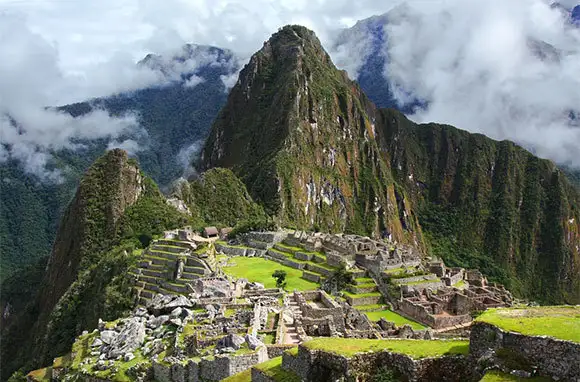
Machu Picchu, Peru
2011 marked the 100th anniversary of the rediscovery of Machu Picchu. In the last century, the Inca ruins have become one of the world's most famous tourist attractions. And as the journey to see the "Lost City" has grown easier with the addition of train service, its remote location high in a cloud forest of the Peruvian Andes hasn't been able to shield it from the damaging effects of extreme popularity.
Uncontrolled development, erosion, and the ongoing risk of landslides that could wipe out the site keep Machu Picchu's future at risk. Last year, in light of the rapid growth to meet tourism needs in nearby Aguas Calientes, UNESCO counseled authorities to take "rigorous emergency measures to counter the growing disorganization" and to create a buffer around Machu Picchu to protect it from urban encroachment.
More From Smartertravel:
We hand-pick everything we recommend and select items through testing and reviews. Some products are sent to us free of charge with no incentive to offer a favorable review. We offer our unbiased opinions and do not accept compensation to review products. All items are in stock and prices are accurate at the time of publication. If you buy something through our links, we may earn a commission.
Related
Top Fares From
Today's Top Travel Deals
Brought to you by ShermansTravel
Shop and Save with Country Inns...
Patricia Magaña
 Hotel & Lodging Deals
Hotel & Lodging Deals
$229 -- Chicago: Discounted Rates and...
Francesca Miele
 Hotel & Lodging Deals
$229+
Hotel & Lodging Deals
$229+
$188 -- Honolulu: Save on Oceanview...
Abigail Lamay
 Hotel & Lodging Deals
$188+
Hotel & Lodging Deals
$188+



